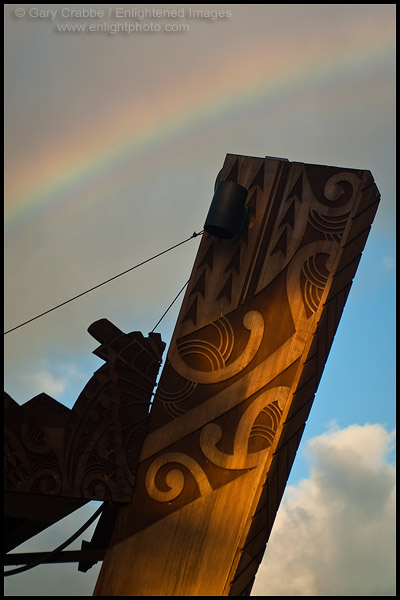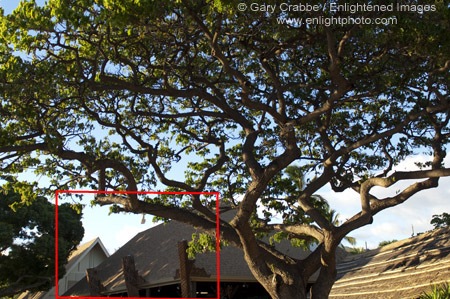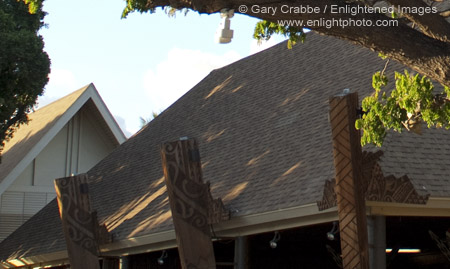Picture: Rainbow over Polynesian motif wood carving, Paradise Cove, Ko Olina, Oahu, Hawaii

I’ve said it before, and I’ll say it again. In fact, I say it just about every time I’m teaching somebody or some group about photography, or giving one of my workshop presentations.
A boring subject in great light will usually make for a better photo than a great subject in boring light.
On our recent family vacation to Hawaii, I was in full “Joe Bob Tourist” mode, snapping photos while at one of the island’s tourist-centric Luau’s. While walking along in the main area between the bar(s) & restrooms, I just lifted my camera to snap a quick shot of the tree and branches. (Below.) The roof in the lower left is where the Buffet Dinner is served. Because I knew I had the buildings in the photo, I thought nothing more of the picture other than being a simple snapshot.
Picture: Tree at the Paradise Cove Luau, Ko Olina, Oahu, Hawaii.

I continued my aimless stroll. Within a few moments, I spied a rainbow low in the sky, just above the roof of the dining hall.
In my brain, I instantly started looking for something to match up with the rainbow. The rainbow was too low in the sky to include the tree I just walked under. The buildings that I was standing next to were just too “yucky”, and a rainbow all by itself is… well, just another rainbow. Then my eyes spied these decorative wood-carved posts on the roof above the dining hall.
Detail from the above photo.

On one of them, dappled sunset light was filtering through the branches of the tree I had just photographed. I knew that if I exposed for the sunset light on the wood, the shadowed areas would appear darker, adding more contrast and drama to the scene. I thought to myself, “I’m in Hawaii and that looks Polynesian. That’ll work.”
According to the RAW Image metadata, the time difference between when I took the tree shot and the rainbow shot was 93 seconds.
This just reinforces what I tell my students, that in addition to looking for nice subjects to photograph, be sure to also be on the lookout for great lighting situations, no matter where it is, or what it’s of. If it’s great light, shoot the light. Make the light the primary, and the subject secondary.
Remember: “A boring subject in great light will usually make for a better photo than a great subject in boring light.“

Very striking image Gary. I’ll have to go into “Gary Crabbe tourist” mode next time I’m traveling.
Great story, Gary – and I totally agree. I use that same thought when I teach, to try and get people to really see the light first and foremost – to recognize good light. Great picture, keep up the wonderful work!